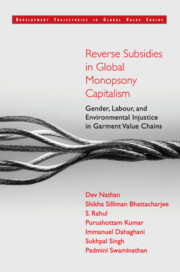 Reverse Subsidies in Global Monopsony Capitalism
Reverse Subsidies in Global Monopsony Capitalism 10 - Externalized Costs of Cotton Production Value Capture
Published online by Cambridge University Press: 21 January 2022
Summary
The upstream of agribusiness, which involves how raw materials are procured or where production takes place, is becoming increasingly important due to issues of social and environmental justice, as against downstream agribusiness, which relates to the purchase, use, and consumption of products as part of the product value chain (Schrempf-Stirling, Palazzo and Phillips 2013). It is not just market failures that lead to externalities—which can, therefore, be attended to with market-based systems—but it is also the ‘cost shifting’ that acts as an externality on those who are either smaller players in the chain or non-participants (Martinez-Alier et al. 2016: 732). Further, agribusiness companies working with primary producers (farmers) are driven solely by the profit motive at most times and tend to ignore the social dimensions of their operations (S. Singh 2016). Examples of such behaviour include abandoning an area if it is found to be unprofitable to continue; excluding small and marginal growers from their operations; and following the practice of ‘agribusiness normalization’, in which lower prices are offered to producers over time or prices are not raised adequately to cut down costs of procurement (Glover and Kustrer 1990: 63).
Most environmental regulations do not help in enhancing revenue; they typically increase cost and reduce the capacity of businesses to generate cash flow (Boehlje, Akridge and Downey 1995). Engaging in social responsibility is considered the key challenge for global sourcing companies and their suppliers in the developing world though it is more challenging to meet regulations. Even more problematic is the belief that if suppliers from a developing country comply with codes of conduct (CoC), it will improve the workers’ conditions and reduce environmental pollution; that is not necessarily the case as the objective conditions prevailing locally are different, for example, overtime and child labour, which are difficult to deal with. More importantly, believing that exclusion of non-complying suppliers is an effective way of securing compliance with codes or standards and, in turn, of improving the conditions of producers or workers and the environment is misplaced as such actions only harm by downgrading such producers or workers (Lund-Thomsen 2008).
Achieving environmental sustainability or upgrading, along with economic and social sustainability, is a part of the ‘triple bottom line’ or three Ps (profits, people, and planet) of corporate entities (Sindhi and Kumar 2012; Campling and Havice 2019).
- Type
- Chapter
- Information
- Reverse Subsidies in Global Monopsony CapitalismGender, Labour, and Environmental Injustice in Garment Value Chains, pp. 185 - 203Publisher: Cambridge University PressPrint publication year: 2022


